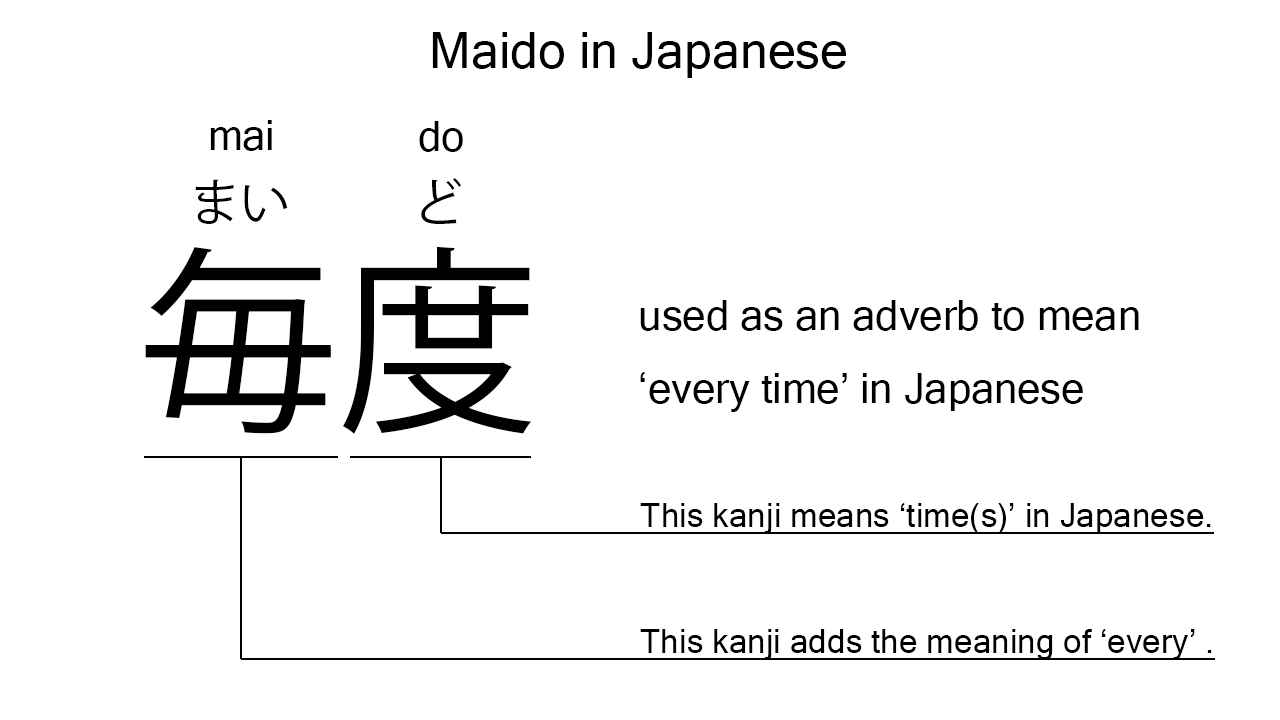What does “maido” mean in Japanese?
Native speakers say “maido” normally to mean ‘every time’ in Japanese. Perhaps, some Japanese learners know this word as it is sometimes used in Japanese conversations. In this blog post, however, I will explain this word in detail based on its kanji expression. And also, I will explain how to use it through example sentences. My explanations would help Japanese learners understand “maido” more clearly. Then, let’s get started!
Contents
Definition and meanings of “maido”
Let me start with the definition and meanings of “maido”.
- maido – 毎度 (まいど) : a noun, but often used as an adverb to mean ‘every time’, ‘each time’, or sometimes ‘always’ in Japanese.
Grammatically this is a noun, but can also work as an adverb. In Japanese, many time-related nouns can also work as adverbs. “Maido” is one of them. It can therefore work almost anywhere in a sentence to say “every time” in Japanese. Perhaps this fact sounds a bit weird to Japanese learners, but this is not unique to the Japanese language. For example, “tomorrow” can work as both a noun and an adverb in English. So, Japanese learners, especially those who are familiar with English, can easily understand this point, I think.
The definition and meanings are not that difficult, I think. To understand this word more clearly, however, let me explain its kanji characters in detail, one by one.
What does “maido” literally mean in Japanese?
Tha kanji expression of “maido” consists of the following two kanji characters:
- 毎 : a kanji character often used as a prefix or suffix to add the meaning of ‘every’.
- 度 : a kanji character used to mean ‘time’, ‘chance’, ‘turn’, or such in Japanese.
These two kanji characters tell us that “maido” literally means ‘every time’ in Japanese. What the kanji characters express is completely in line with the actual meanings.

When we meet new kanji expressions, we should check their kanji characters in detail to understand their meanings clearly and deeply. In many cases, kanji characters tell us a lot about the meanings of the expressions they form. Actually, here, we could get the better understanding of “maido” through the detailed kanji check above.
So far, I’ve explained the definition and meanings of “maido” together with its kanji characters. Then, let me explain how to use it through the example sentences below.
Example #1: how to say “every time” in Japanese
kanojo wa maido boku wo nayamasu – 彼女は毎度僕を悩ます (かのじょはまいどぼくをなやます)
She bothers me every time.
Below are the new words used in the example sentence.
- kanojo – 彼女 (かのじょ) : a pronoun meaning ‘she’ in Japanese.
- wa – は : a binding particle working as a case marker or topic marker. In the example, this works after “kanojo” to make the subject in the sentence.
- boku – 僕 (ぼく) : a pronoun meaning ‘I’ in Japanese. This is used mainly by boys and young males.
- wo – を : a case particle used to make the object word in a sentence. In the example, this is used after “boku” to make the object in the sentence.
- nayamasu – 悩ます (なやます) : a verb meaning ‘to bother’ or such in Japanese.
This is a typical usage of “maido”. In the example, it works as an adverb in the middle of the sentence to say “every time” in Japanese.
Example #2: another usage of “maido”
maido arigatou gozaimasu – 毎度ありがとうございます (まいどありがとうございます)
Thank you as always.
Below are the new words used in the example sentence.
- arigatou – ありがとう : a phrase meaning ‘thank you’ in Japanese.
- gozaimasu – ございます : a verb politely meaning ‘to be’, ‘to exist’, or such in Japanese. This can also work like an auxiliary verb to make the preceding word or phrase polite. In the example, this works after “arigatou” to make it sound polite.
This is another typical usage of “maido”. In this example, it works together with “arigatou gozaimasu” to mean ‘thank you as always’ in Japanese. Japanese people who work at restaurants, shops, and the like often use this example sentence to express their appreciation to customers.
Summary
In this blog post, I’ve explained the definition and meanings of “maido” in detail based on its kanji expression. And also, I’ve explained how to use it through the example sentences. Let me summarize them as follows.
- maido – 毎度 (まいど) : a noun, but often used as an adverb to mean ‘every time’, ‘each time’, or sometimes ‘always’ in Japanese. These two kanji characters literally mean ‘every time’ in Japanese. What the kanji characters express is completely in line with the actual meanings.
Hope my explanations are understandable and helpful for Japanese learners.
Leave a Reply